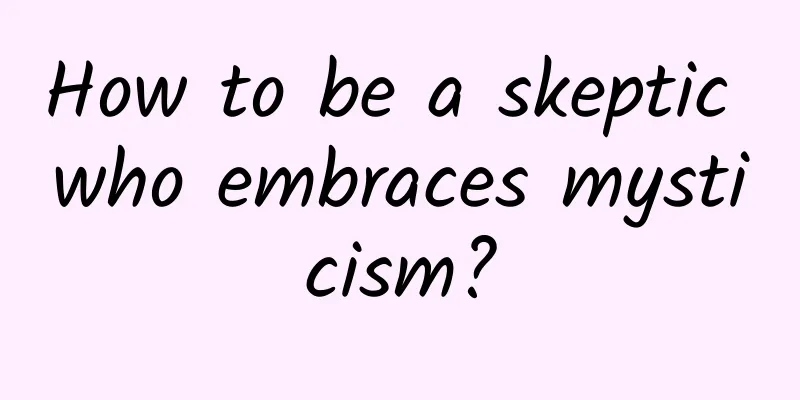How to be a skeptic who embraces mysticism?

|
© OneZero - Medium Leviathan Press: People who believe in science may attribute some of the so-called mystical phenomena today to "events that cannot be explained by science at present". The meaning of this sentence is also very clear. In time, future science will definitely be able to decipher these mystical phenomena, such as near-death experience and soul out-of-body experience. Of course, in addition to these mystical experiences, whether the self, consciousness, and free will exist are also topics of endless debate today. Unlike dualists, materialists or physical reductionists, the psychologist Susan Blackmore in this article holds a certain cautious optimism about "panpsychism". However, whether panpsychism is a credible view at the intellectual level still needs further verification. Psychologist Susan Blackmore. © Adam Hart-Davis Here’s how I described psychologist Susan Blackmore, slightly modified, when I interviewed her 20 years ago while researching my book Rational Mysticism: “Her hair was short, like a boy’s, with splashes of orange, red and yellow, and dark roots, and her sideburns daggered over her ears, which were pierced with hoops. She spoke quickly and in a panic, with rich gestures and facial expressions. Blackmore was also fond of onomatopoeia: aaaaaa (to express her joy at finding other smart people after entering Oxford), thump, thump, thump (the sound of air rushing through a tree-lined tunnel during her first out-of-body experience), and ziz, ziz, zit (the sound of reality dissolving during her second dose of the hallucinogen dimethyltryptamine). We spoke in the restaurant of Blackmore's hotel, and twice we moved to a quieter spot because staff or patrons were talking near us. Blackmore explained that one side effect of her spiritual practice is that she has a hard time ignoring stimulation: 'I think that's one of the side effects of practicing mindfulness, that I'm very aware of everything around me at all times.'" Blackmore started out as a parapsychologist looking for evidence of astral projection and extrasensory perception. She gradually became a materialist and Darwinist who did not believe in extrasensory perception, God, or free will (she described humans as "memetic machines" in one of her best-known works). But she's also a mystic, exploring consciousness through meditation and psychic experiences. In other words, Blackmore is both a staunch skeptic and an open-minded adventurer. She's everything we imagine a scientist studying the mind to be. What more could you ask for? I was curious about how her thinking has evolved in these heady times, so I asked her a few questions via email. Here's an edited transcript of the interview. ﹡﹡﹡ John Horgan: Have you ever thought that you'd better be less skeptical? Blackmore: No, absolutely not. If by "skepticism" you mean curiosity, questioning, looking for evidence, and wanting to change someone's mind, then I would say that is exactly what I aspire to. But if by "skepticism" you mean being closed-minded, just skeptical for the sake of skepticism, without any interest in verifying anything, then I would say that I know that is a very easy state to fall into and it should be avoided. Rupert Sheldrake, the originator of Morphic Field and Morphic Resonance. © Rupert Sheldrake Horgan: My skepticism about ESP and other parapsychological phenomena sometimes softens when I meet people who believe in them, like Rupert Sheldrake, Freeman Dyson, and Stuart Kauffman. Has that ever happened to you? Blackmore: No. In fact, it's when I'm with these people that my skepticism peaks. What is he talking about? Does this make sense? Do I need to find out more about this? In Sheldrake's case, I studied his work in detail a long time ago, including collecting data for one of his experiments. His early work just disillusioned me, and I was not impressed by his claims. However, I haven't studied his later work in detail, so I can't make the final judgment. When the two of us get together, we always have a friendly discussion of the subject, but neither of us can convince the other. Dyson and Kaufman are very different. They challenge fundamental views of the universe. Crucially, they do not make meaningless parapsychological claims, but rather dig into deep ideas about matter, information, the origin of life, order, and complexity. Although my knowledge of mathematics and physics is quite superficial, I love their work. I also have endless doubts about the nature of the universe, and the work of pioneers like them in this area is inspiring. Freeman Dyson, best known for his idea for a structure called a Dyson sphere, a plan to surround the sun or a star to maximize its sunlight. © The New York Times Horgan: In recent years, panpsychism and other views that challenge traditional materialism have become popular. What do you think of these? Blackmore: Materialism is hopeless in this regard because once it comes to questions about consciousness, materialism becomes dualism. Dualism is hopeless because it cannot explain the intimate connection between matter and experience. Neuroscientists, in their search for “neural correlates of consciousness,” are really viewing consciousness as something that the brain creates or produces, and so they run into a “problem.” It is a mistake to define the problem in terms of how subjective experience arises from objective brain activity. The problem cannot be solved because its premise is incorrect from the beginning. At the other extreme are those who believe in the "mind over body", "infinite consciousness", "consciousness first". These views are also doomed to failure for the same reasons as materialism. These "consciousness first" people also cannot explain the brain/consciousness relationship, and they also cannot explain why we live in this material world. This question is deep and interesting. Materialism cannot explain consciousness, and idealism cannot explain matter. What we need is a non-dualistic worldview, but we don't have such a theory yet. Panpsychism may help us achieve this goal (or it may not), but it is certainly not self-sufficient. In my opinion, traditional panpsychism (that every atom, molecule, stone, house, everything has its own experience) does not make sense at all. Philip Goff's version of panpsychism is interesting, but it does not seem to work. What I personally find most appealing about panpsychism is an idea I've played around with so much myself that I even wrote about it on the back of a conference paper in the 1980s! In the study of consciousness, we ask, "What is it like to be a bat?" I would argue that this is the wrong question to ask. There is no experience of "being a bat" in the physical sense - we can only say what it's like to be a bat in the "likeness of a bat." For a bat (or any other creature), "what it's like to be a bat" is the experience of being a bat in the likeness of a bat. © Peter Sjöstedt-H As an animal, we construct more complex representations at multiple levels through sensory systems, motor systems, memory, and imagination. Overlying all of these representations gives us this false sense of “I”—a self-centered, self-controlled, self-experiencing model that doesn’t really exist—and so we have to ask, “What is it like to be ‘I’?” However, beneath this model of the self lurks many other representations. My version of panpsychism implies that at every level, from the simplest short-term structures to complex fictional models of the self, they all have their own experiences - whatever those representations say that experience is. I have explored these ideas frequently, both in very rigorous and structured thinking and in my own daily meditations and psychedelic self-exploration. However, I do not feel that this version of panpsychism (or any other version of it) solves the great mysteries of the human mind! Horgan: Daniel Dennett’s claim that consciousness is an “illusion” just doesn’t make sense to me. Am I missing something? Blackmore: Haha. You sure missed a lot! I've made this point, and it's been made by many people who study their minds with great confusion. You haven't really examined your assumptions about consciousness—the things you take for granted and don't even ask about because they seem so obvious. You may be confused, as most people are, but I certainly don't know what your assumptions about consciousness are. For example: you might imagine that you are some inner self with consciousness and free will; you might imagine that "you" make your consciousness think some things and not others; you might imagine that some processes in your mind are conscious and others are not; you might imagine that you do some things and not others because of conscious involvement; you might imagine that consciousness has power and produces real effects and must have evolved the way it is for some purpose. Each of these very natural assumptions has perfectly good counterarguments. In other words, consciousness is, as we usually imagine it, an illusion. What, then, does "hallucination" mean? Look in the dictionary (which is what I turn to when someone tells me they don't believe in consciousness). The dictionary says that an illusion is something that is not what it seems to be. This fits our problem perfectly. My point is that it is only possible to have a sound theory of consciousness if we discard all of the false assumptions above and decide to start from scratch. Horgan: I doubt we'll ever find a completely satisfactory answer to the mind-body problem. What do you think? Blackmore: The answer seems to be in some kind of meditative or psychedelic state. First, the answer is definitely not dualism, there is only one explanation for everything, and experience exists independently of the experiencer. However, at least for me, this clear insight disappears when I return to normal, and I don’t have a revelation and declare, “Ahaha—now I have a completely satisfactory answer to the dualism problem.” Can we get such an answer? I like this question - will there be someone who is very good at neuroscience and philosophy who will be inspired to come up with a perfect answer? Can a neuroscientist and philosopher who has such a deep understanding of this problem come up with such an answer? What do you think? Horgan: I don't think this problem can be solved, even by people with multiple PhDs and very deep knowledge. Next question: Memetics, which was pioneered by Richard Dawkins and to which you have made great contributions, has been sharply criticized. Do you have anything to defend? Blackmore: There's nothing to defend. I'd rather explain the theory because so many people misunderstand it, or are scared of it, or both. Once you fully understand the idea, you can decide for yourself whether it's worth defending. It's simple - just a little scary. The replicator is the information that has been processed by the evolutionary algorithm. This means it can be copied, changed, selected, and this unconscious repetition process can produce novel designs. We think of genes as the first replicators on Earth. They are selfish and evolve only for their own benefit. Dawkins realized that cultural information—all the things we can replicate from culture—is similar. So he proposed that memes are the second replicators. In my book The Meme Machine, I discuss how memes turn us into their replicators, and how the memes that ultimately win are not always in our favor. Blackmore, The Meme Machine. © Riverwash Books Think about the explosion of internet memes, fake news, cults that pull people into lies, suicides and anorexia. These memes use us to spread, but they also hurt us. Coming back to your question, there was a recent study that found that the persecution of witches in Europe benefited no one but the witch trials themselves. That’s the point – if selfish ideas (meme machines) do spread for their own benefit (and not for ours), then memetics are useful and important. (culturalscience.org/articles/10.5334/csci.116/) Horgan: I can't live without free will, but you've said that denying it gives you a sense of freedom. What do you see that I'm missing? Blackmore: I've spent most of my life giving up the idea that I have free will, and you don't. You can live without it if you really want to - it takes a lot of giving up, and I'm still working on that. A long time ago, I once concluded that everything humans do is caused by internal processes that we cannot see, and the self that seems to be in control of everything actually does not play any role. Therefore, I must find a way to coexist with myself. The new freedom is freedom from illusion. © youtube Daniel Dennett and I have been discussing this issue back and forth, and we have certainly enjoyed it. I admire his work on consciousness and his concept of illusion, but here we have a fundamental disagreement. According to his theory, I think he should claim that free will is part of the illusion of self and consciousness, but he does not agree with this view. Horgan: It seems to me that our existence is so incredible and so bizarre that I find it hard to believe that it happened by accident. Do you ever feel that way? Blackmore: No, I don't. Not at all. Why should I feel that way? And why would you ask this question, or is it just to provoke a conversation? It's incredible that we exist, and it certainly didn't just happen by chance - at least not by chance. Asking this question is like asking: A gust of wind blowing through a scrapyard can't make a Boeing 747, so God must have created us. This is certainly not the case. We evolved, like all other organisms. Evolution by natural selection creates designs without a designer, and it involves three steps: 1. Information must be copied; 2. The copies must be able to change; 3. Only some of the copies survive to be copied again. "Chance" is just one source of the changes that must occur. Chance by itself obviously could not have created something as incredible as us, but natural selection could and did. We were not created according to God's imagination. Horgan: I have a love-hate relationship with Buddhism. What do you think of it? Blackmore: I have been studying Zen Buddhism since 1981 and I personally love the practice of Zen. However, I find Buddhism so bogged down in doctrine, theory, rules, vows and rituals that I hate it. I particularly hate (and I use that word because you did!) that Buddhism teaches that the self is an illusion (rather than the persistent entity it might seem at first glance) but that many branches of Buddhism generally promote the idea of personal reincarnation. It's crazy! This is also why after practicing Zen for 40 years, I still haven't become a Buddhist or made those great vows. © Medium Horgan: What effect did meditation have on you, or what effect did it not have on you? Blackmore: Oh, haha. How would I know? Maybe meditation wouldn't make a difference, I'd still be the same person, just inevitably older. There's no control group. But I can say that meditation seems to have had some effects on me. I think I'm happier, have fewer stupid thoughts and worries, have a more positive outlook on life (perhaps this is the most important thing), and probably seem less annoying to others. The only definite effect of meditation is that I can easily sit still for more than an hour and calmly observe what is happening around me. I have a better understanding of my chaotic thoughts. In addition, through decades of attention training, I can enter specific states of consciousness, such as "silent illumination" or Zen meditation. This is what meditation is all about - attention training. Horgan: Did the psychedelic experience give you any lasting insights into the nature of existence? Blakemore: Exactly. The nothingness of the self, the non-duality or inseparability of the inner self, the vastness of the realms that can emerge in the mind, the mystical experiences that can be readily accessed through chemical means, and the emptiness of theories that consciousness transcends death are all accessible through the stimulation of the living brain through psychedelic experience. Horgan: Do you believe in this timeless mystical state of awareness called enlightenment? Have you ever met anyone who seems to be that enlightened? Blackmore: For the first question, my answer is no. As far as I know, enlightenment is not a "permanent mystical state of cognition". It is not a state at all, but a loss of self-illusion and subject illusion, a kind of seeing through, a letting go, and an acceptance of the impermanence of the world, the suffering of life and the illusion of self. This sounds like not being a human being at all, but I don't think so. For the second question, my answer is some great Zen monks. Traditionally, the word "enlightenment" has multiple meanings. Enlightenment experiences happen, but there are degrees of enlightenment beyond "enlightened people" or "people whose minds are completely liberated." I don't know if these very impressive people are truly "fully enlightened," and they certainly wouldn't say so, nor would anyone else say so. So I'll leave it at that. Horgan: For a serious academic, you seem to be having a lot of fun. Is that accurate? If so, how do you do it? Blackmore: Well, I never go out of my way to have fun - but I'm glad if I make you feel like I'm having fun. I remember when I was 18, my cousin would say, "Let's go have some fun!" I'd say, "I don't like to have fun," and then I'd be embarrassed by what I'd said, but it was true. I liked the excitement, the adventure, but did I like to have fun? I'm not sure. As a student, I spent my evenings analyzing data from physics experiments rather than partying or going out with friends. I still don't like going out - at least not for fun. Playing in a samba band is certainly fun, but my main pleasures in life are much quieter - writing articles, doing research, exploring my own mind through drugs, meditating or just thinking, gardening, and playing with my grandchildren - that's fun too! Horgan: What is your idea of utopia? Blackmore: No. I suspect that human nature makes us incapable of imagining utopias. However, we are pretty good at imagining dystopias. Living in an Islamic country under sharia law as a woman is the worst thing I have ever known. Hopefully, we will never stoop to that level. Editor's note: This article was originally published with the title "How to Become a Materialist Who Accepts Mysticism", but Blackmore said that she is by no means a materialist, and the reasons are mentioned in the text. By John Horgan Translated by Qiao Qi Proofreading/Rabbit's Light Footsteps Original article/www.scientificamerican.com/article/how-to-be-a-mystical-skeptic/ This article is based on the Creative Commons Agreement (BY-NC) and is published by Qiao Qi on Leviathan The article only reflects the author's views and does not necessarily represent the position of Leviathan |
<<: Will pterygium "recur" after surgery? Don't panic!
Recommend
Does constipation in pregnant women have a big impact on the fetus?
Constipation is a disease that affects the digest...
What to do about irritability during menopause
After women enter menopause, they will experience...
Leukocytic leukocyte esterase 10
Because women are very susceptible to various pat...
Can I fill my teeth during my period?
We all know about tooth fillings, but many female...
What are some quick ways for women to get rid of dampness and detoxify?
As we all know, there are six evil spirits in the...
What is the treatment for ovarian cysts?
Although medical technology is constantly improvi...
What is "white lung"? Pay attention to your health in time
Science Fiction Network, December 27th: Recently,...
How many days after menstruation is the safe period?
Many young women don’t know much about pregnancy,...
What is the most effective way to tighten the breasts?
We all pay attention to the coordination of our b...
What kind of ring is not harmful to the body?
IUD insertion is a common contraceptive method fo...
What are the treatments for uterine fibroids?
Uterine fibroids are the most common benign tumor...
What should I do if I don't have my period after taking Progynaecology?
Important reminder: This article mainly introduce...
The causes and treatment of girls' thick legs
Thick legs are a problem that many women have, es...
The woman's belly button hurts when she presses it
In daily life, many people don’t actually pay muc...









